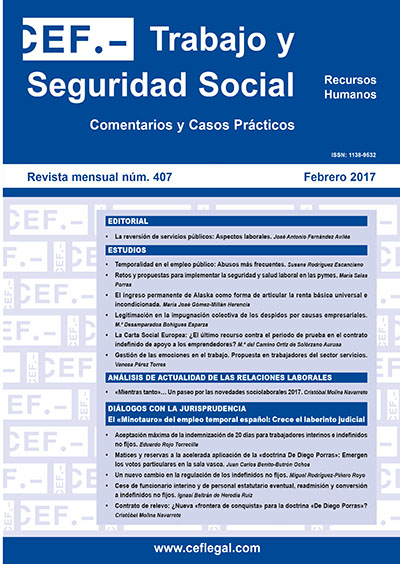The legitimation in the collective challenge of the collective dismissal to economic, organizational, technical or production
DOI:
https://doi.org/10.51302/rtss.2017.1946Keywords:
legitimation, collective dismissal, collective challengeAbstract
One of the key institutions in all industrial relations system is, without doubt, the termination of the employment contract. And the collective dismissal on economic, technical, organizational or production is one of the most important mechanisms of extinction and complex regulation of labor law, both substantive and procedural perspective.
The authorizing role of the labor authority disappeared, except in cases of force majeure continues, and as a result, labor procedural rules had to be adapted, as they have affected certain provisions of the Law Regulating Jurisdiction Social, including those relating to the challenging of the collective dismissal on economic, technical, organizational or production regulated in Article 124 of this law.
The complexity of this new procedural modality makes it essential to address the study of legitimacy to challenge a collective dismissal, the object of this paper being to perform a normative analysis of the legitimation to challenge a collective dismissal. Likewise, the treatment of passive legitimation will be studied, as well as the main interpretative doubts that its application generates.
Downloads
References
Ballester Laguna, F. [2013]: La impugnación del despido colectivo: en el marco del artículo 124 de la Ley 36/2011, de 10 de octubre, reguladora de la jurisdicción social, Valencia: Tirant lo Blanch.
Blasco Pellicer, A. y García Testal, E. [2013]: «Otros procesos por extinción de la relación laboral», en A. Blasco Pellicer, (dir.), El proceso laboral. Ley 36/2011 de 10 de octubre, reguladora de la jurisdicción social, tomo I, Valencia: Tirant lo Blanch, págs. 815-877.
Cavas Martínez, F. [2013]: «El procedimiento de impugnación del despido colectivo tras la reforma laboral de 2012», Aranzadi Social Doctrinal, vol. 6, núm. 2, págs. 15-37. Consultado en formato electrónico.
García Piñeiro, N. P. [2012]: «Aspectos procesales de la reforma: Despido Colectivo y otras cuestiones», en A. Montoya Melgar y J. García Murcia (dirs.), Comentario a la reforma laboral de 2012, Cizur Menor (Navarra): Civitas Thomson Reuters, págs. 313-340.
Lluch Corell, F. J. [2012]: «La impugnación de los despidos colectivos tras la Ley 3/2012, de 6 de julio: Una aproximación al art. 124 LRJS (I)», Revista de Jurisprudencia, núm. 1, págs. 1-6.
Luján Alcaráz, J. y Tárraga Poveda, J. [2012]: «Legitimación activa en la nueva modalidad procesal de despidos colectivos», Aranzadi Social: Revista Doctrinal, vol. 5, núm. 2, págs. 399-404.
Maneiro Vázquez, Y. [2013]: «La nueva modalidad procesal de despido colectivo tras la reforma laboral de 2012», Actualidad Laboral, núm. 3, págs. 1-11.
Nores Torres, L. E. [2013]: «La extinción de contrato de trabajo en la reforma laboral de 2012», Arxius de Ciències Socials, núm. 28, págs. 57-71.
Palomo Balda, E. [2013]: «Puntos críticos del despido colectivo. Aspectos sustantivos y procesales y propuestas de reforma», Jornadas sobre la Devaluación de las Garantías Colectivas en el Gobierno de las Relaciones de Trabajo, organizadas por UGT y el CGPJ, págs. 1-12.
Preciado Domènech, C. H. [2013]: El nuevo proceso de despido colectivo en la Ley 3/2012, de 6 de julio, Albacete: Bomarzo.



















